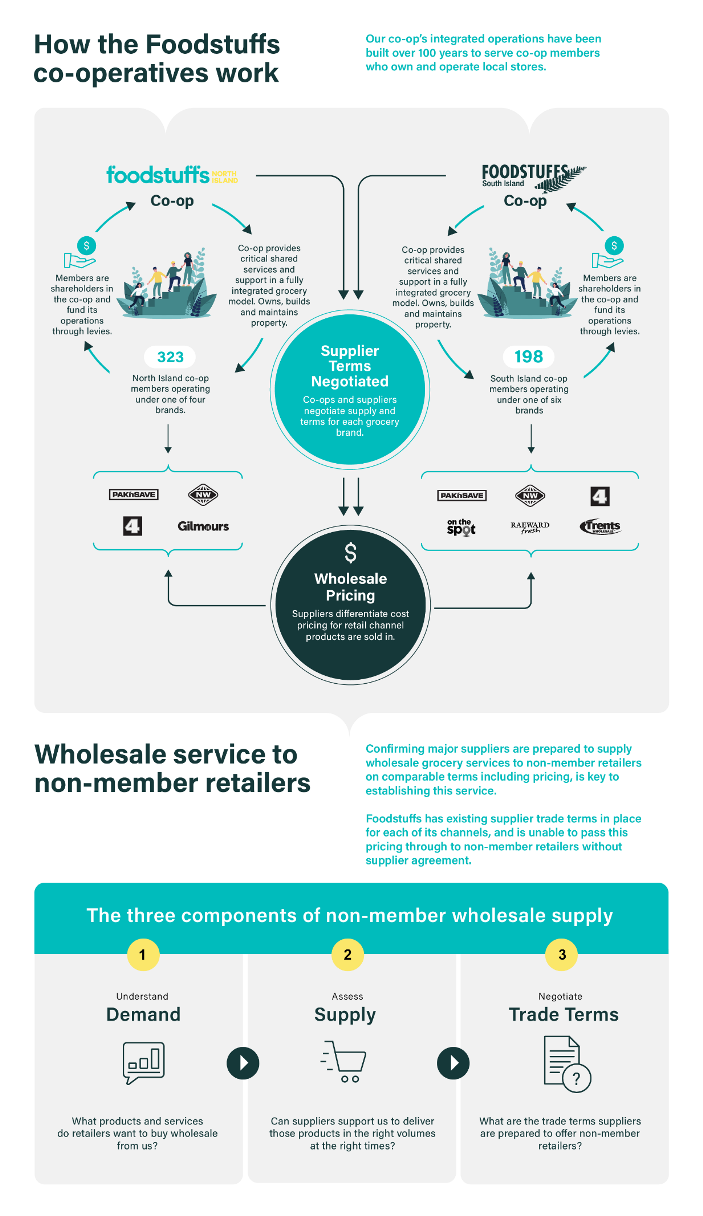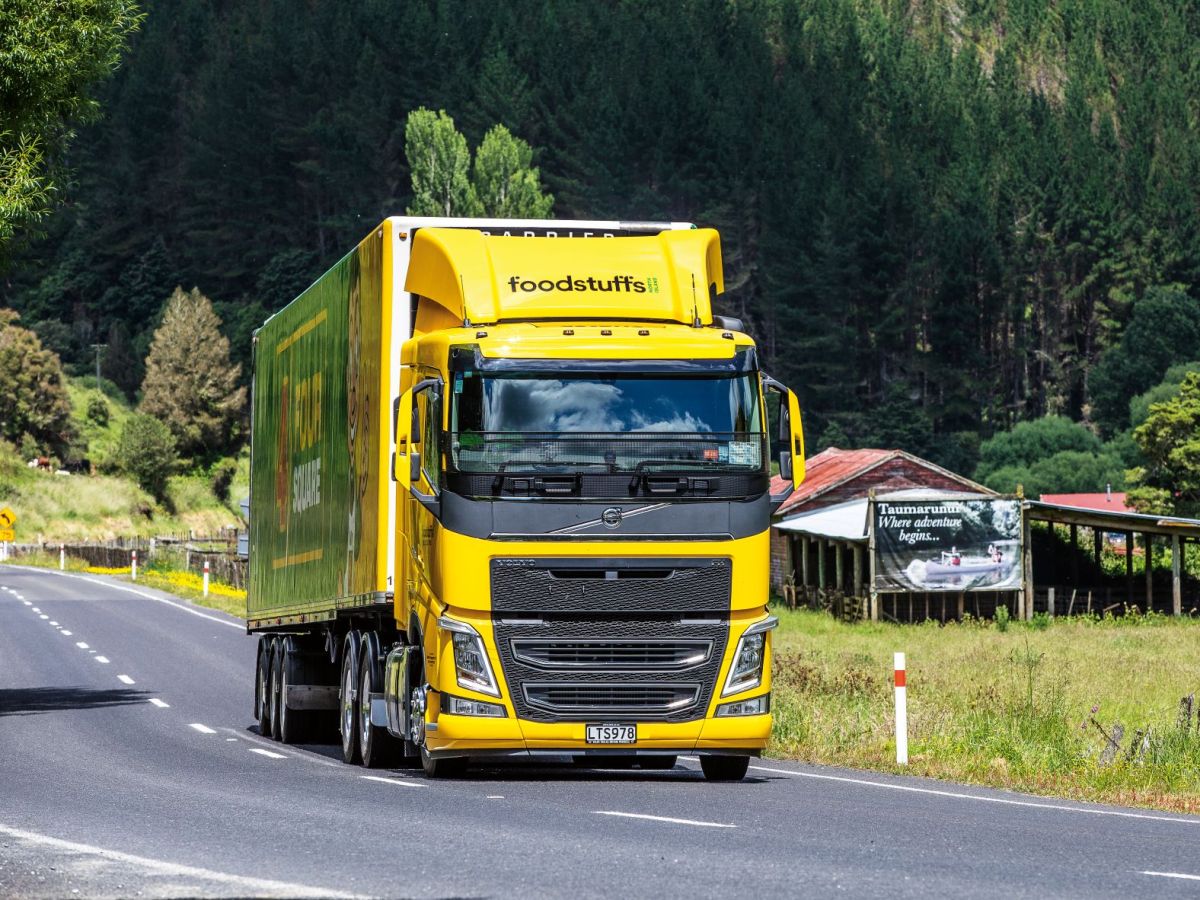Retailers wanting to buy wholesale groceries to on-sell in their stores can now express interest to become a wholesale customer of Foodstuffs, as the NZ-owned co-operatives set up a new service to supply a wide range of retail-ready groceries to retailers who are not members of the co-ops.
“Wholesaling groceries to retailers who aren’t members of our co-op isn’t as simple as opening the doors of our distribution centres and letting trucks roll up,” says Chris Quin, Foodstuffs NZ Managing Director. “Our co-op’s operations have been built over 100 years to serve our members’ 521 locally owned and operated stores. Providing retail-ready wholesale groceries to non-members means setting up a new service for retailers who are not integrated into our co-operatives.”
“This is a complex service to set up, but we’re in a good position to provide a wholesale solution that works for retailers who aren’t part of our co-op – we’ve got existing infrastructure and processes across our current B2B wholesale business and our supply chain that mean we’re not starting from scratch,” says Quin. “That said, there’s a lot to work through to make this offer work well for retailers who aren’t co-op members, but we’re building it with urgency.”
For Foodstuffs to offer full-service wholesale supply of a wide range of retailer grocery products on competitive terms to non-member retailers, there are three key things that need to be understood: retailer demand for wholesale grocery service, access to product supply, and supplier trade terms.
Quin says this means answering three questions: “What do retailers want to buy wholesale from us? Can suppliers support us to deliver those products in the right volumes at the right times? And what are the wholesale (cost) price terms suppliers are prepared to offer non-member retailers?”
Understanding what retailers need from a wholesale service
The first step of making this work is understanding the customer need from retailers who aren’t members of the co-ops. Which potential or existing retailers are interested in wholesale supply through Foodstuffs, what do they want to buy and what service do they need?
“We have conversations underway with four potential customers already, and are engaging to establish their business needs so we can design a solution for them,” says Quin.
“Any other retailers who are interested in wholesale supply can register as a potential wholesale customer now and our teams will work through the process with them.”
Retailers who are interested in wholesale supply through the Foodstuffs network can register here.
“Once we know who wants wholesale groceries from us, and what they need in terms of things like service level, range and volume, we can take that information to negotiations with suppliers,” says Quin.
Working with suppliers to offer wholesale groceries for non-member retailers
The next step of the process the Foodstuffs team are working through is understanding from suppliers whether they can supply to a wholesale grocery service on comparable terms to what they offer to the retail businesses in the Foodstuffs co-ops – including cost price.
Suppliers currently differentiate their cost pricing to the co-ops according to the retail channel their goods are sold in. To make wholesale to other retailers that aren’t part of the Foodstuffs co-ops work, this will have to change.
“Our supplier partners are a key part of getting this new wholesale service right. It’s their products that will stock the shelves of the new wholesale service, and supplier cost prices make up the biggest proportion of the shelf price so their willingness to work with us on this is critical. For each dollar on the supermarket shelf, supplier costs make up 68c.”
Foodstuffs gets their range of retail ready grocery products from over 3,500 suppliers for their independently owned member stores to purchase, and many of these products are supplied by large global FMCG companies.
“We’re starting the conversation on this with suppliers, expressing a clear need for them to supply Foodstuffs’ wholesale business on equivalent terms as they do for our retail businesses, so we can service non-member retail competitors appropriately. We can’t do this without support from suppliers, and we’re optimistic that they’ll understand the need to deliver for New Zealand consumers.”
Foodstuffs says it will also be critically important to establish the appropriate protocols for protecting everyone’s confidentiality as competing retailers in the market under the Commerce Act as these new wholesale supply arrangements are set up.
Discussions on this are underway with the potential wholesale customers Foodstuffs are already in contact with.
Making it happen
“We have several streams of work well underway to complete this wholesale supply solution, and are well-prepared to serve any potential customers given our existing expertise and business processes in this area,” says Quin.
Completing a wholesale supply solution for non-member retailers is just one of the pieces of work Foodstuffs has gotten on with to support competition in the industry and make sure that New Zealanders are getting value at the supermarket checkout.
“What matters most is that New Zealand customers get the best possible prices on their groceries,” says Quin. “We’re committed to doing everything we can to enable this, and despite food price inflation of 6.8% in May, retail prices to Foodstuffs customers on the same products increased 4.7% – meaning we held prices at 2.1% less than inflation in May.”
Foodstuffs continues to look for ways to support New Zealanders to find value every day, and the 100% NZ owned co-operatives are getting on with implementing the Commerce Commission’s market study recommendations to make a difference for New Zealanders. More information can be found on the market study reporting dashboard.




